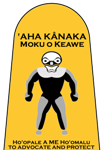How was Hawai’i annexed by the US? How did Hawai’i become the 50th state of the United States?
It wasn’t and it’s not. The U.S. made 3 attempts to annex Hawai’i and failed each time. So, the U.S. Senate and the House of Representatives passed a resolution to annex Hawai’i (which has no effect beyond the borders of the U.S.), falsely convincing everybody that it was a lawful act, when in fact a country cannot pass a law annexing a foreign country. Hawai’i became the 50th state by ballot trickery. The ballot contained no option for independence. Any American citizen 20 years or older who had lived in Hawai’i for at least a year was allowed to vote, even U.S. military. And they did. Thus, the wrong people voted.
What is a Hawaiian Kingdom Subject? Are they considered to be colonized? Are they indigenous? Are they kanaka maoli? Are they native Hawaiian?
A Hawaiian Kingdom subject is a person that belonged to the Hawaiian Kingdom prior to the overthrow of the Hawaiian Kingdom government. Their descendants are also considered Hawaiian Kingdom subjects. Conversely, indigenous people are ethnic groups who are the earliest known inhabitants of a particular area or territory WITHIN a country, but are not recognized as an independent State. The Hawaiian Kingdom is an internationally-recognized independent country, which is why its people are considered “subjects” as opposed to “indigenous.” While only Hawaiian Kingdom laws apply on Hawaiian Kingdom soil, multiple sets of laws may apply in a country where indigenous people are colonized. In the Hawaiian language, a full-blooded aboriginal Hawaiian is kanaka maoli.
Should Hawaiian Subjects vote in an American election?
In legal terms, voting in an American election would not be constitutional in accordance with Hawaiian Kingdom law.
How long will the transition to restore the Hawaiian Kingdom government take?
The question is difficult to answer because it first requires the U.S. to comply with the Laws of Occupation. However, there are several international law experts that agree that the Hawaiian Kingdom’s claims are valid and recognize the Council of Regency, which currently represents the Hawaiian Kingdom in accordance with article 33 of the Hawaiian Constitution. In 2001, the Permanent Court of Arbitration acknowledged the Hawaiian Kingdom to be an independent State (Country).
What military force would protect Hawai’i? What would protect Hawai’i from being overtaken by another country?
Once occupation ends, the Hawaiian Kingdom National Guard would protect the Hawaiian Kingdom. In addition, international treaties provide for peaceful co-operation among nations including the prevention of nations from taking control of other nations. (Example: Iraq/Kuwait).
Who is Dr. David “Keanu” Sai?
Dr. David "Keanu" Sai has a Ph.D. in Political Science specializing in Hawaiian Constitutionalism and International Relations, and is a founding member of the Hawaiian Society of Law & Politics. He serves as lead Agent for the Hawaiian Kingdom in arbitration proceedings before the Permanent Court of Arbitration at The Hague, Netherlands. He also served as Agent in a complaint against the United States of America concerning the prolonged occupation of the Hawaiian Kingdom, which was filed with the United Nations Security Council. On March 1, 1996, David “Keanu” Sai was appointed Acting Regent to serve in the capacity as an acting government and assume the de facto role of the Council of Regency so that the legal order of the Hawaiian State can be represented both domestically and internationally.
Why does it matter to me? Why should I care?
It is important to all who live on the Hawaiian Islands to advocate political, social and economic advancements to protect the ʻāina, customs, traditional and constitutional rights and to continue to be consistent and persistent in educating ourselves and others as it changes Hawai’i’s future.
There are a lot of groups out there representing Hawai’i’s sovereignty and rights. Who should we be following?
As in any situation, one should use his or her own judgement, however, it is imperative that one base that judgement on fact rather than opinion. It is also important to view the issues facing Hawaiians from a broader perspective rather than by any singular crisis (Mauna Kea, for example). ‘Aha Kānaka Moku o Keawe is an educational organization dedicated to sharing the political status of the Hawaiian Kingdom and is in agreement with the principles and strategy set forth by the only legally-recognized Acting Regent of the Hawaiian Kingdom.
How can I help?
Mahalo! Let us know how you would like to assist in carrying out our mission.

